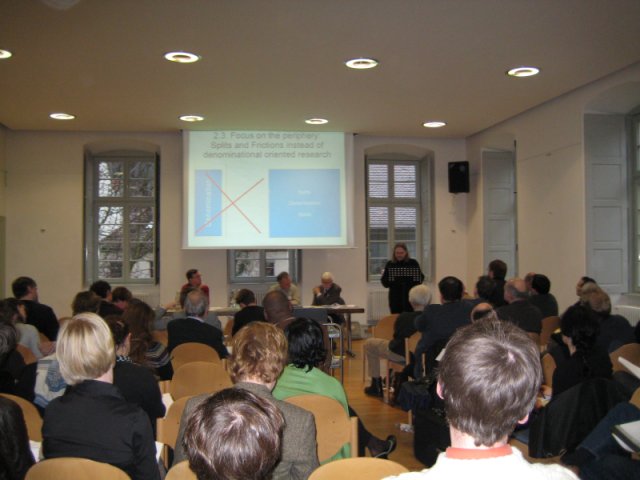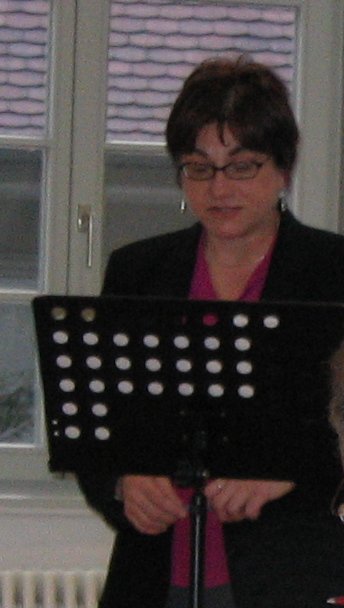Heidelberg GloPent Conference Report
The third international and interdisciplinary conference of the “European Research Network on Global Pentecostalism” (GloPent), titled “Theory and Method in the Study of Global Pentecostalism”, was hosted in Heidelberg on 1 and 2 February, 2008.
About 90 participants from eight European countries and the USA convened at Heidelberg and interacted with presentations from various academic disciplines (see programme), including cultural anthropology, religious studies, gender studies, and theology. The strong multidisciplinary focus was perceived as a unique contribution of GloPent to the study of global Pentecostalism.
Prof Birgit Meyer (Vrije Universiteit Amsterdam) considered the relationship between globalisation and Pentecostalism, and argued against a narrow use of the Weberian thesis about the relation between Protestantism and the rise of capitalism. Instead she advocated a closer investigation of Pentecostalism as a global and post-modern religion, by turning to central study foci, such as the Pentecostal imagery of the world, its conceptualization of space and time, its materiality, use of media, aesthetics, and style.

Prof Allan Anderson (University of Birmingham) and Prof Michael Bergunder (University of Heidelberg) interacted on the question of defining Pentecostalism. Anderson gave an overview of social-scientific, historical, and theological approaches to the definition of Pentecostalism, advocating an inclusive definition, which centers on movements with an emphasis on the experience of the Spirit and the exercise of spiritual gifts. Bergunder embarked on analysing Pentecostalism from a cultural and postcolonial studies perspective, and presented a programmatic outline of the implications of postcolonial theory for the understanding of Pentecostalism as a global discursive network.
Prof Veli-Matti Kärkkäinen (Fuller Theological Seminary and University of Helsinki) gave a presentation on the state of Pentecostal theological scholarship on Pneumatology. Mapping the diversity of theological contributions, he charted the contributions of Pentecostals to established theology and their theological distinctives, while at the same time highlighting the tension between Pentecostal/Charismatic understanding of the spirit in pneumatology and its role in soteriology, or a theology of religions.
 Prof Elizabeth Brusco (Pacific
Lutheran University) surveyed recent contributions to gender studies with regard to Pentecostal/Charismatic churches,
inquiring about adequacy in representing the female
majority in worldwide Pentecostalism. She called for a move beyond
the marginalization hypothesis by allowing women both value and
agency, envisioning their conversion as a linked set of processes
that renegotiate gender and family relationships as well as personal
identity. As such, women in Pentecostalism are also a challenge to
Western feminism, since the transformations they induce, often center
around the home, and not so much the public arena.
Prof Elizabeth Brusco (Pacific
Lutheran University) surveyed recent contributions to gender studies with regard to Pentecostal/Charismatic churches,
inquiring about adequacy in representing the female
majority in worldwide Pentecostalism. She called for a move beyond
the marginalization hypothesis by allowing women both value and
agency, envisioning their conversion as a linked set of processes
that renegotiate gender and family relationships as well as personal
identity. As such, women in Pentecostalism are also a challenge to
Western feminism, since the transformations they induce, often center
around the home, and not so much the public arena.
Dr Mark Cartledge (University of Birmingham) presented a uniquely comprehensive review of Pentecostal scholarship in practical theology, sorting them into the three strands of pastoralia, liberation theology, and empirical theology. Cartledge found that most of the practical-theological contributions are produced by Pentecostal-Charismatic scholars at the level of the seminary, and noted a predominant interest in pastoralia, i.e. a focus on formational or ministerial questions and concerns. For practical theology to develop and flourish in the context of Pentecostal-Charismatic studies, he called for a greater critical engagement with the liberationist and empirical traditions.
These presentations were complemented with responses by Dr Stephen Hunt (University of the West of England), Prof André Droogers (Vrije Universiteit Amsterdam), Prof Friederike Nüssel (University of Heidelberg), Prof Heinrich Schäfer (University of Bielefeld), and Prof Ulrich Duchrow (University of Heidelberg), who helped to initiate informed discussions.
For the first time, the Dr Richard
Burgess, Dr Kim Knibbe, and Anna Quaas, researchers
in the GloPent/NORFACE research project “Transnational Nigerian
Pentecostal Churches, Networks and Believers in Three Northern
Countries: Migrant Churches as a Potential and Potent Social Force”,
gave an overview of their work in the past ten months and presented
the findings of their preliminary research in the Netherlands, the
United Kingdom, and Germany.
Dr Linda van de Kamp, Gerald King, and Claudia Währisch-Oblau illustrated the scope of current research in the network with presentations of their projects, about the “Transnational Dimension of Brazilian Pentecostal Churches in Mozambique” (van de Kamp), the “Fundamentalist-Pentecostal Relations in the US fom 1900-1943” (King), and “Migrants with a Mission” in Germany (Währisch-Oblau).
The Heidelberg conference, was the
third and last in a series of three meetings pertaining to
theoretical and methodological approaches in the study of global
Pentecostalism, which is aimed at producing an interdisciplinary
study guide to global Pentecostalism, to be published early 2009. We
thank our host Michael Bergunder and his staff for the
smooth organization of the conference.
The next GloPent is planned for Birmingham in February 2009.

